CRE Brokers Lean Into AI
A new tech toolkit is changing dealmaking.

The launch of OpenAI’s ChatGPT in late 2022 introduced the world to the capabilities of generative AI, which can spin up content on demand and hold human-like conversations with users. The hugely popular chatbot, along with similar tools released in its wake, has begun to remake the world of white-collar work.
As use cases crop up across various industries, commercial real estate brokers are learning to harness the evolving technology to optimize their workflows and improve the speed and quality of their services. It’s a trial-and-error process of discovering which AI tools are genuinely useful and which are a waste of time. AI power users believe it gives them a significant edge.
“In order to scale in any operation, you have to have streamlined systems, and these tools are going to help you get there much quicker than if you were not to use them at all,” said Raphael Collazo, president & co-founder of Summit Commercial Group.
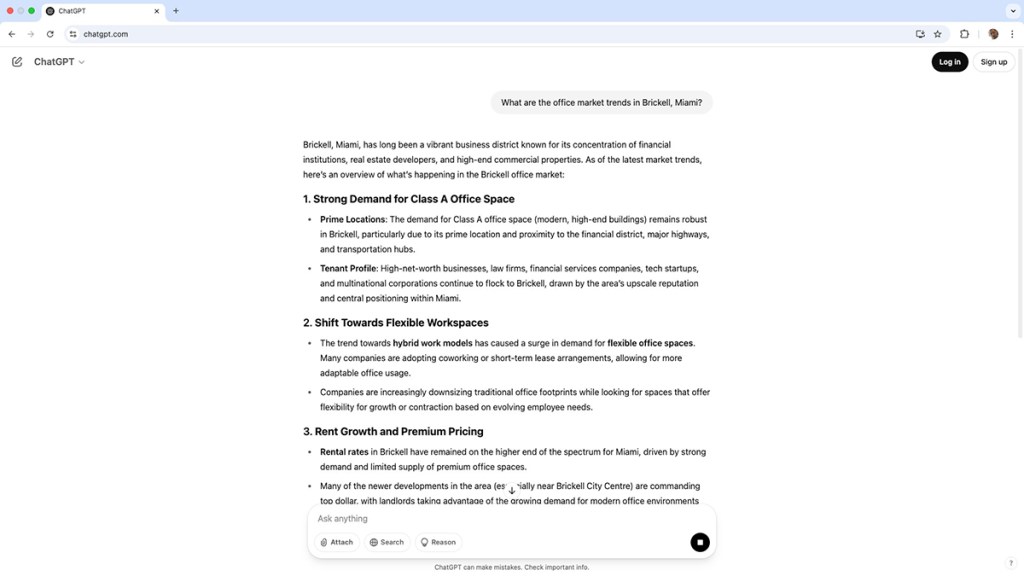
Augmented insights

Collazo, a heavy ChatGPT user, created his own custom Generative Pre-trained Transformer, a bespoke version of ChatGPT that’s trained to focus on specific tasks or topics. Users can make a custom GPT by simply uploading their business content into the platform with no coding required.
The retail and industrial property specialist formed his custom GPT by feeding it industry knowledge, such as his CCIM coursework. Having ingested these documents, the AI model understands real estate and financial concepts and can perform analysis. “When I speak in jargon to the GPT, it can respond much more readily,” he shared.
In order to scale in any operation, you have to have streamlined systems, and these tools are going to help you get there much quicker than if you weren’t using them at all.
—Raphael Collazo, President & Co-founder, Summit Commercial Group
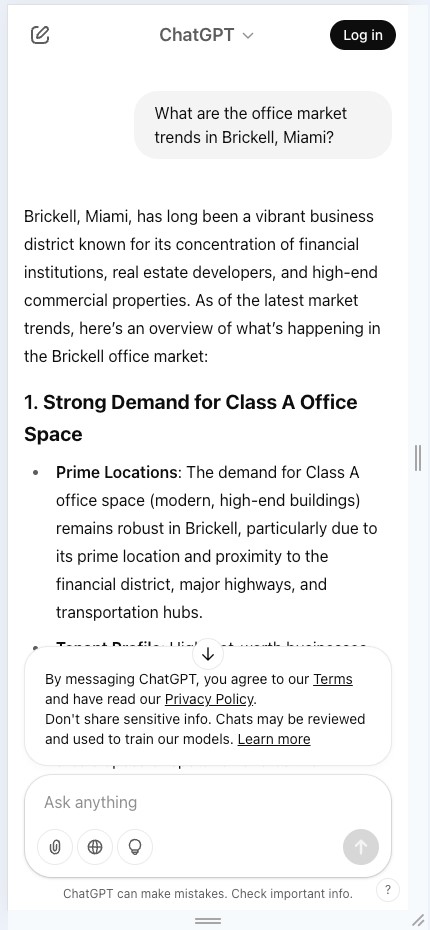
While ChatGPT is by far the most popular AI platform, with over 400 million weekly active users, many commercial brokers prefer Perplexity for its ability to search the web in real time while answering their questions. Connor Dale, senior associate broker at Chicago-based NAI Hiffman turned to Perplexity to conduct site selection for a health-care client looking to expand nationally.
Dale cautioned that Perplexity’s reports need to be verified and supplemented with other data. “I always check my work,” he noted. “I’m obviously never sending anything that AI spits back out to me.”
Still, he uses AI platforms for many different tasks, “whether it’s market research, analysis, property due diligence, investment analysis, standard client communication, putting rent schedules together.”
AI-driven insights can enable valuable time savings for brokers. “If you take a look at something like document abstraction, there’s really important data that’s locked up in these extremely long documents, and with AI, brokers can instantly extract key data from complex documents like leases,” pointed out Carlin Power, JLL’s head of AI product engagement. “They can then reinvest that time into providing better client experiences.”
The commercial brokerage, which has more than 60 AI tools in production or active development, reports that its AI-enabled platform, JLL Falcon, is increasingly popular with nearly 38,000 active monthly users.
Machine authors

Another area where generative AI is proving pivotal for many brokers is marketing content creation, an important function that otherwise eats up a lot of time. Collazo leverages AI to help create content for LinkedIn and Facebook. What’s more, his custom GPT is trained in the three books he has authored, so it can mimic his voice.
“Probably the strongest AI case that exists today—and it’s practical and real and works well—is generative AI for developing marketing content,” observed David Franklin, an industry principal at Yardi Systems.
Broker outreach tasks like sending emails and creating listings are also obvious candidates for AI-driven automation. “Those types of things are perfect for just having ChatGPT help you write something,” said Franklin.
Probably the strongest AI case that exists today—and it’s practical and real and works well—is generative AI for developing marketing content.
—David Franklin, Industry Principal, Yardi Systems
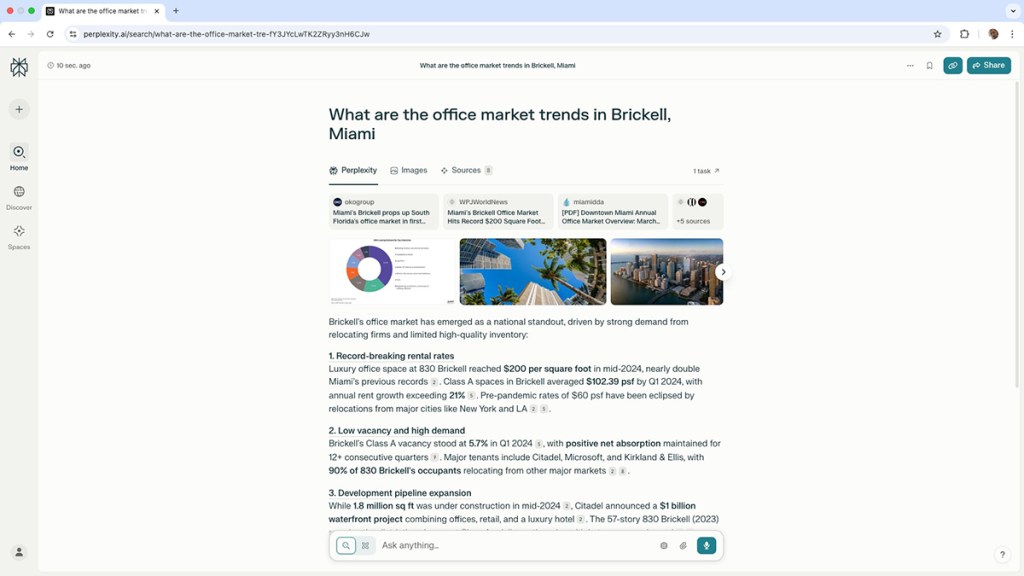
One of the most striking features of recent AI models, their ability to turn out compelling imagery and videos in seconds, is another advantage for brokers trying to sell a client on a real estate strategy. Some tools that the industry is adopting for this purpose include Runway and Invideo AI for video generation from text prompts; Gamma for designing marketing brochures, tour books and pitch decks; Google’s Notebook LM for turning notes into podcasts; and Qbic for automated layout planning.
Mitchell Hernandez, partner & co-founder at retail brokerage Beta, explained how generative AI can operate on multiple levels to enrich real estate dealmaking. “Not only can I customize the words and the usage and know what you care about but I can now take that to a higher degree and show you a rendering that would take two to three weeks at probably $2,500 to $10,000, and we can actually generate that in about a minute,” he said.
“But I’ll take it a step further,” added Hernandez. “I can also really, really work on something. And I can show you the before and after. Now I can show you Apple. I can show you West Elm. I can show you whatever I want. I could take a Google Street View and do that. So, to me, it’s actually trying to elevate the information, not replace anything. That’s truly the opportunity.”
Use with caution
Investment firm Vanguard Group estimates that AI will bring an average productivity lift of more than 20 percent across all U.S. jobs by 2035. It’s unclear how that figure applies to the commercial real estate industry, but many of the routine tasks that make up a broker’s daily grind—such as scheduling, note-taking and client follows-ups—are susceptible to being automated away.
[I can] show you a rendering that would take two to three weeks at probably $2,500 to $10,000, and we can actually generate that in about a minute.
—Mitchell Hernandez, Partner & Co-Founder at Beta
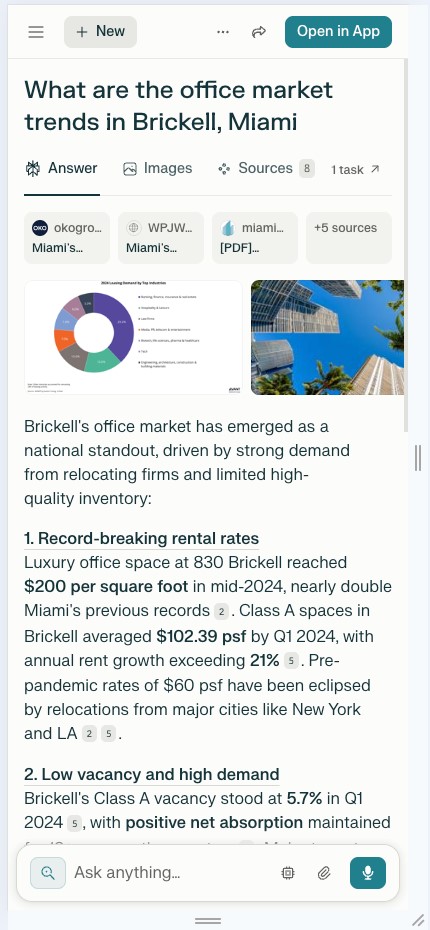
That said, brokers need to be thoughtful about how they implement AI into their workflows. A serious consideration when using an AI platform is its ability to keep confidential client information private and secure. Platforms such as ChatGPT, Perplexity and Anthropic’s Claude offer enterprise versions with special controls designed to safeguard sensitive data.
Bottom-up adoption of AI tools by individual brokers can prompt companies to set up organizational accounts that have better checks and balances to maintain privacy. “I think it’s really imperative that organizations are starting to define and understand how they want to roll out these strategies, because if they don’t, then the individuals that work for various organizations are going to do it themselves,” noted Hernandez.
Over-reliance on AI can also compromise the quality of a broker’s output. For instance, lease abstraction software can swiftly scan a lease agreement, extract key information and generate an abstract that some brokers may send to the client without reviewing it. “I would highly recommend against it because it’s not always accurate and there will be mistakes,” said Dale.
And AI in its current form cannot match the level of understanding that an experienced broker can bring to the table. “Going out and researching comps and trying to understand trends and seeing the big-picture cycles are much more nuanced things that generative AI and large language models are going to be much more challenged with,” said Franklin.
But, he added, “the models are getting smarter, the capabilities are getting stronger and the range of things that AI will be applicable to is getting much wider.”

Connor Dale, a senior associate broker at NAI Hiffman, leveraged AI platform Perplexity to help a health-care client identify a suitable location for its national expansion.
The platform, which fetches information from the web in real time while answering questions, generated demographic reports and competitor mapping that helped Dale’s team create and narrow down a list of cities that seemed to offer the strongest opportunities for his client.
Homing in on the west Houston area, the team used Perplexity to pinpoint the company’s rivals on a map and find gaps within the market. Their research surfaced the city of Katy, just west of Houston, as a highly promising market for the company, a provider of autism therapy.
From there, the team pulled together a list of available vacancies in Katy using more conventional real estate data tools. After touring some options, the client is on the verge of signing a new lease.


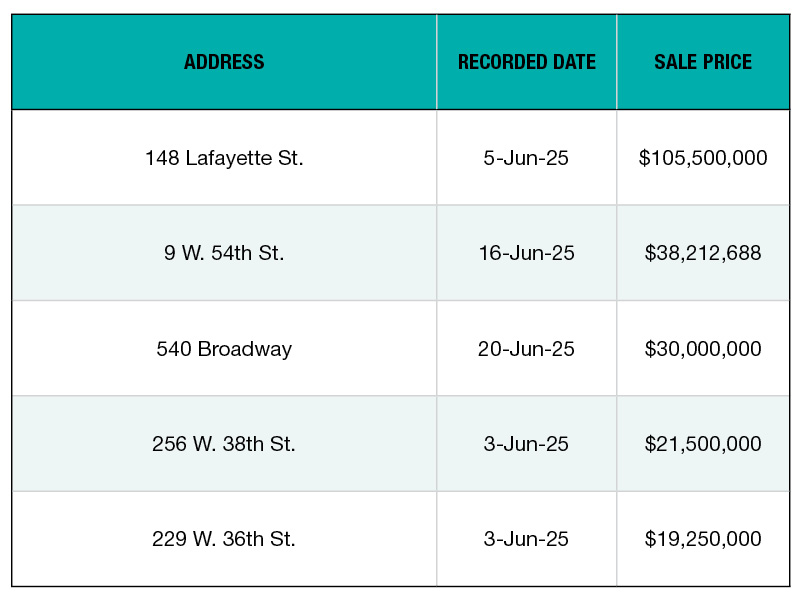





You must be logged in to post a comment.